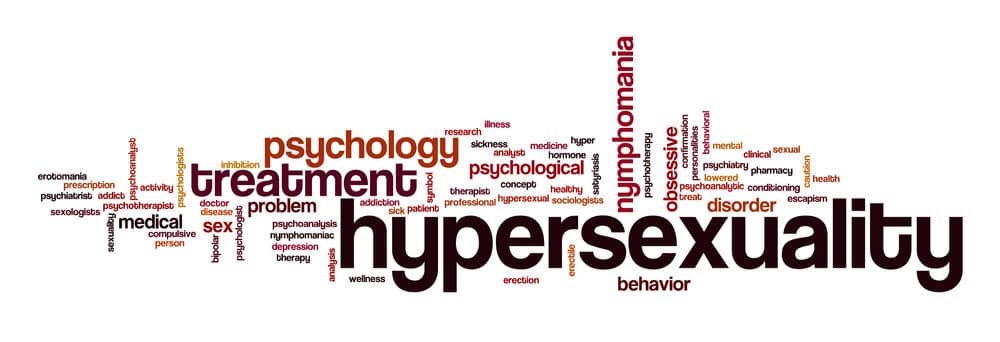Sex addiction and pornography addiction — often referred to as Hypersexuality Disorder — have yet to be formally recognised as specific conditions by the American Psychiatric Association in the Diagnostic and Statistical Manual of Mental Disorders (DSM-5). It may be considered compulsive sexual behavior (CSB) when sexual habits become difficult to control, and are disruptive to you or others. The World Health Organization has recommended that compulsive sexual behavior be included in the upcoming eleventh edition of International Classification Diseases as an impulse control disorder. Nonetheless patterns of compulsive sexual behavior causing serious problems and distress to individuals and families are very real. It will take time for evidence from research to catch up with the often harmful sexual behaviors reported by patients and observed by clinicians. These patterns and the symptoms they produce appear to align, in many respects, with the diagnostic profile of addiction.
In addiction, the ability of whatever substance (e.g., alcohol, cocaine or nicotine) or behaviour (e.g., gambling, shopping, exercise) to change the way a person feels, quickly and effectively, is pivotal. Their attraction lies in their ability to stimulate the reward centres of the brain. Sexual behaviour is one such activity. For some people, the pleasurable effect is so powerful that they do not merely want to repeat the experience sometime in the future, they feel compelled to do so, and soon. There is an emotional urgency akin to craving, especially as they find positive effects on mood wear off too quickly. With the frequency of repetition increasing, the compulsive pursuit of short-term sexual gratification begins to preoccupy the mind, eventually taking over much of everyday life.

Sexual activity either involves the presence of another person or multiple sexual partners or involves masturbation with or without viewing pornography while alone. Disordered inter-personal repetitive sexual impulses may encompass multiple short-term encounters with strangers where there is almost no emotional investment, in contrast to non-addictive relationships. Apart from short-term excitement or relief, it can ultimately feel unsatisfying. Repetitive visits to sex workers, cruising, or risky sex, sometimes with use of substances (“chem sex”), may feature. Sexual impulses indulged while alone may include obsessive consumption of pornography both offline or online (through web cams or other devices); broadly known as cybersex.
The internet and the speed of access to it has significantly increased the range and availability of pornography. Accessibility, affordability and anonymity drive problems; the last of these being particularly important for a stigmatised behaviour pattern. Secrecy protects against any challenge or interference but it is also a way to manage the shame that many sex and pornography addicts feel about their compulsive behaviour. Unfortunately it increases isolation and disconnection from others, which in turn encourages the habit. It also explains why low self-esteem, anxiety and depression commonly co-exist with compulsive sexual behaviour.

The strong sense of losing or having lost control is often what leads people to seek help. Trapped by a seeming inability to stop despite the distressing evidence of mounting harmful consequences, anxiety ramps up. The ingrained response to this distress is now predictably more of the same mood-altering behaviour. Harm may include sexually transmitted infection or conflict with people closest to the addicted person or with life more generally, especially when personal values or the achievement of life goals become threatened. As more and more time is consumed by the activity as well as by thinking about it, the addicted person often finds the enjoyment of sexual experiences with their partner suffers. For men this may include the development of erectile dysfunction. Correspondingly, partners may feel intimacy diminishing and sense an emotional withdrawal from the relationship by the addicted individual. Faced with the damaging impact of hyper sexual behaviour, the person may try to stop or cut down yet find such self-denial impossible to sustain untreated compulsive sexual behavior.
It can be very difficult to decide what treatment to take. If someone is convinced they’re engaged in excessive sexual activity, seeking help right away can be very important. Ask a general physician to do an extensive physical evaluation. This can eliminate any mental or physical conditions underlying your behavior. If your condition requires further investigation and testing, consult a psychologist and/or psychiatrist. Depending upon your medical diagnosis and treatment plan, mental health professionals can perform an assessment and ask questions that include your family members and friends.
Find facilities with treatment for various substance abuse including mental disorders, drug use or alcohol addictions to help treat the problem. Look for a treatment center with the capacity to treat and manage both disorders simultaneously. Residential treatment for addiction like Clinic Les Alpes is often a good option.

Treatments for compulsive sexual behaviors often involve medication, counseling, group activities and therapy sessions. Treatment has a major objective of controlling your urges and decreasing excess behaviors in order to maintain good sexual activity. In some cases, if a person has an obsession with sex, it could lead to a psychological disorder. Some people have addiction issues or other mental disorders like depression or anxiety. And some patients may have relapsed from other mental illnesses and addiction.
Psychotherapy (also called talk therapy) can help improve compulsive behavior. These therapy options are available in individual, group, family/couple formats.
Used to blunt the effects of withdrawal or to help treat and manage symptoms of mental disorders. Other treatments may help to reduce a person’s sexual urges or to reduce stress hormones. The medicines used to prevent or relieve compulsive sexual behavior are typically given primarily for underlying medical disorders.
Using self-help groups or support groups can be helpful if one has compulsive sexual habits. Several of the organizations follow an AA 12-step model. They can be based online, have a local in-person meeting or both. You may find a group that is well-known and comfortable. This group may not suit everyone’s tastes. Ask psychiatric specialists if there’s a support group that’s available or alternative.
Given the degree of secrecy, social isolation and breakdown in meaningful interpersonal relationships that often characterises compulsive sexual behaviour, it may be advisable to take advantage of therapeutic expertise offered in a residential setting with 24-hour care, especially if there are co-existing health problems. Time out from everyday life in a safe, contained, supportive environment offers a period of abstinence and thus the opportunity to explore without pressure very sensitive issues, including the possible impact of past trauma on current behaviour patterns and mental health.
We are here to help. Contact us in all confidentiality.
